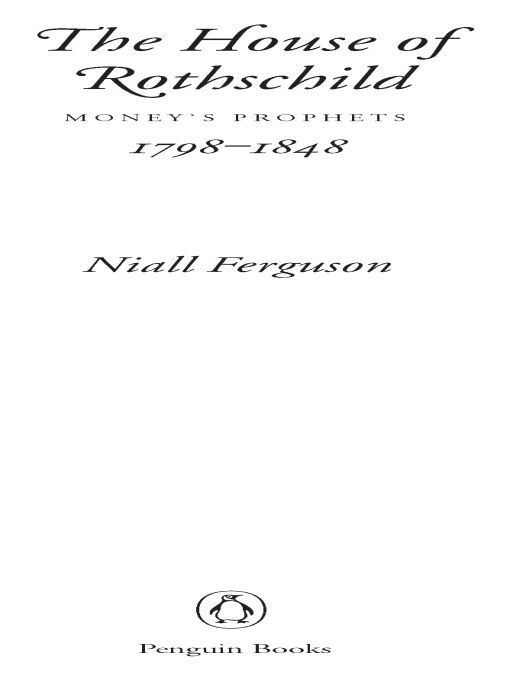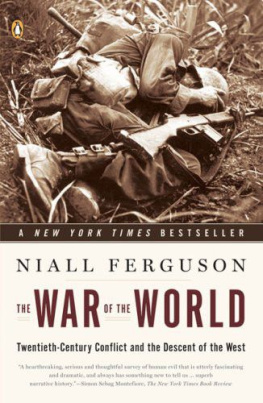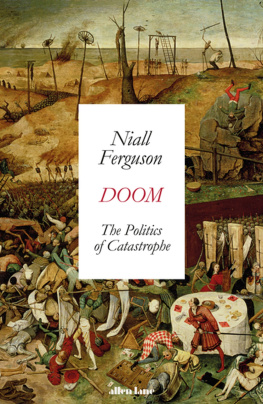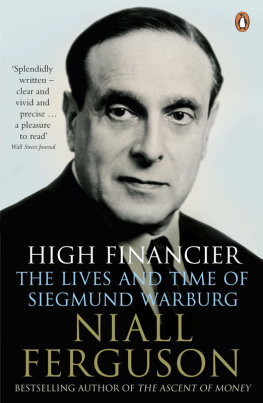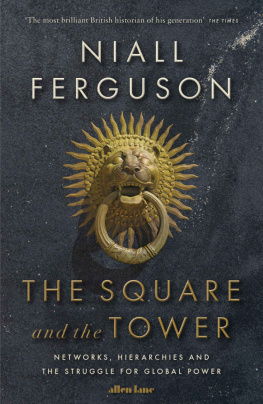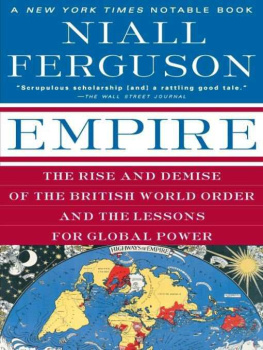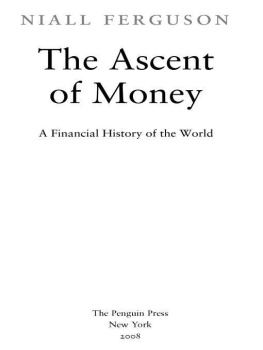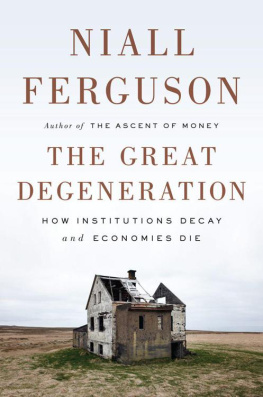Table of Contents
Praise for The House of Rothschild: Moneys Prophets, 1798-1848
This is a major achievement of historical scholarship and historical imagination. Fergusons work reaffirms ones faith in the possibility of great historical writing.Fritz Stern
Fergusons first volume on the Rothschilds is a tour de force by a brilliant and industrious young scholar.
Los Angeles Times Book Review
A great biography.Time magazine
Absorbing... Their enthralling story has been told before, but never in such authoritative detail.
The New York Times Book Review
Well written, superbly illustrated... account of the Rothschilds phenomenal success. The Boston Globe Book Review
Niall Fergusons rich and compelling new book... is a feast.
The Wall Street Journal
Spellbinding, [Ferguson] has done a brilliant job of depicting this far-flung family and also offers an amazing insiders look. His exhaustive study surpasses anything about the Rothschilds to date.
Publishers Weekly (starred review)
Fergusons fluid, masterful synthesis of a vast amount of material... brings vitality to a series of compelling issues.
Business Week
[Ferguson] skillfully weaves together the financial and family themes of the book. Any reader fascinated by modern financing and banking will be well satisfied. But [The House of Rothschild ]... will give even more pleasure to those captivated by a unique dynasty... that flourished beyond all dreams.
The American Statesman
PENGUIN BOOKS
THE HOUSE OF ROTHSCHILD
Born in Glasgow in 1964, Niall Ferguson is Fellow and Tutor of Modern History at Jesus College, Oxford, as well as a political commentator and author. His previous publications include Paper and Iron: Hamburg Business and German Politics in the Era of Inflation 1897-1927, the bestselling book, Virtual History: Alternatives and Counterfactuals, and The Pity of War.
For Susan, Felix and Freya
ACKNOWLEDGEMENTS
Documents from the Royal Archives at Windsor Castle are quoted with the gracious permission of Her Majesty the Queen. It was Sir Evelyn de Rothschild, chairman of N. M. Rothschild & Sons, who originally suggested that the writing of a history of the firm would be a good way to mark the bicentenary of his great-great-grandfather Nathan Mayer Rothschilds arrival in England; I owe a special debt to him for opening the Rothschild Archive to me. Amschel Rothschild also took a keen interest in the project before his tragic death in 1996. Lord Rothschild, Edmund de Rothschild, Leopold de Rothschild and Baron David de Rothschild were all kind enough to agree to be interviewed. They and others also took the trouble to read and comment on substantial parts of the text. I am grateful to Miriam Rothschild for her corrections to an early version of the epilogue, and to Baron Guy de Rothschild for his looking over those passages relating to the recent history of the French bank and family. Emma Rothschild read and commented on the first draft in its entirety, a considerable distraction from her own research and writing for which I thank her. Lionel de Rothschild saved me from innumerable slips by reading and meticulously annotating the first draft, a labour for which this acknowledgement seems a very meagre wage. I should also like to thank the Earl and Countess of Rosebery for giving me access to the private papers of the 5th Earl, and for their kind hospitality at Dalmeny.
A number of directors and employees at N. M. Rothschild & Sons have also assisted me. In particular, I should like to thank Tony Chapman, Russell Edey, Grant Manheim, Bernard Myers and David Sullivan, as well as Lorna Lindsay, Hazel Matthews and Oleg Sheiko.
A project such as this depends heavily on the expertise and toil of archivists and librarians. I owe a special debt of gratitude to those at the Rothschild Archive: Victor Gray and Melanie Aspey, and their assistants Tamsin Black and Mandy Bell, who have uncomplainingly put up with my erratic work methods and unpredictable demands. I should also like to thank their predecessors, Simone Mace and Ann Andlaw. Sheila de Bellaigue, Registrar of the Royal Archives at Windsor Castle, was a model of efficiency; as were Henry Gillett and Sarah Millard at the Bank of England and Robin Harcourt-Williams at Hatfield House. I should like to record my gratitude to Dr M. M. Muchamedjanov and his assistants at the Centre for the Preservation of Historical Documentary Collections in Moscow. In addition, I and my research assistants have received invaluable help from the archivists and librarians at the Anglo-Jewish Archives, University of Southampton; the Archives Nationales, Paris; the Bayerisches Hauptstaatsarchiv, Munich; the Birmingham University Library; the Bodleian Library; the British Library; the Cambridge University Library; the Geheime Staatsarchiv Preussischer Kulturbesitz, Berlin-Dahlem; the Hessische Staatsarchiv, Marburg; the House of Lords Record Office; the Institut fr Stadtgeschichte, Frankfurt; the Jewish Museum, Frankfurt; the Leo Baeck Institute, New York; the National Library of Scotland; Rhodes House, Oxford; The Times Archive; and the Thringische Hauptstaatsarchiv, Weimar.
See Note: On Being an Authorised Author at the end of the acknowledgements.
Lord Weidenfeld was the match-maker who suggested that I might like to write this book and for that (and many other kindnesses) I shall always be in his debt. I am indebted too to Anthony Cheetham at Orion for investing in me and offering only encouragement as deadlines passed and the manuscript overshot the agreed length. Ion Trewin has been and is a superb editor; the same goes for Peter James, my copy-editor. I should also like to thank Rachel Leyshon, Francis Gotto and Carl Stott for their contributions.
My agents, successively Gill Coleridge and Georgina Capel, provided all the shrewd advice and tenacious negotiation an author could wish for.
This book could not have been written in five yearsindeed, it could not have been writtenwithout a great deal of research assistance. I must make special mention of Mordechai Zucker, whose unique ability to decipher the archaic Hebrew script used by the first and second generations of Rothschilds was a sine qua non. Thanks to the translations which he had been working on for years before I came on the scene, and through his tape-recorded readings of the original Judendeutsch, Mordechai has been the eyes through which I have been able to read the most important of all the documents on which this book is based. Nor would I have got far with the correspondence of the French Rothschilds without the invaluable Abi gail Green, who also hunted down long-lost literary allusions to the Rothschilds. Edward Lipman did great things on financial questions; while Rainer Liedtke provided vital expertise on Jewish history. Harry Seekings and Glen OHara slaved over nineteenth-century financial statistics. Andrew Vereker chased Natty Rothschilds dispersed political correspondence. I should also like to thank Katherine Astill, Elizabeth Emerson, Bernhard Fulda, Tobias Jones and Suzanne Nicholas.
The finished text owes much to the critical comments of other historians on earlier drafts. David Landes acted on the familys behalf as a kind of editor-cum-

